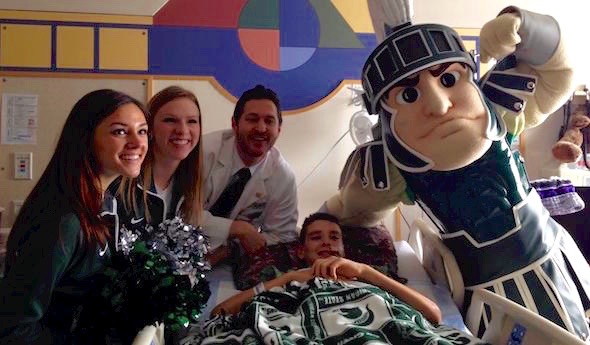
Athens' #13 Makes 'Miracle' Comeback
By
Pam Shebest
Special for MHSAA.com
October 19, 2015
ATHENS — Damon Knowles talked about baseball and basketball with his cousin, Luke Lamson, one warm Sunday last December.
That’s not unusual for the two young teens, but that day Lamson lay crushed beneath the wheels of a semi trailer loaded with corn and weighing more than 30,000 pounds.
 His cousin had crawled beneath the trailer to keep Lamson awake until the ambulance arrived with the Jaws of Life. Both boys were in eighth grade at the time.
His cousin had crawled beneath the trailer to keep Lamson awake until the ambulance arrived with the Jaws of Life. Both boys were in eighth grade at the time.
Immediately following the accident, “My dad told me to go get the phone so we could call 911,” Knowles, 14, said. “I went under the trailer and was talking to Luke. I just had to keep asking him if he could breathe.”
That accident drastically changed the way Lamson figured his freshman year at Athens High School would play out. Instead of running cross country and playing basketball this year, he is on the sidelines cheering his teammates.
The fact the 14-year-old can actually do that now is a story of amazing recovery and faith.
Knowles, his dad John and Lamson were the only ones at the farm, moving the corn to the silo at the time of the accident. None of them knows exactly how the accident happened, but John Knowles said the ground was soft from rain the day before, which probably kept his nephew from being crushed to death.


 Lamson said he was awake the entire time, but doesn’t remember much about the accident.
Lamson said he was awake the entire time, but doesn’t remember much about the accident.
“It didn’t kill him because we kept the pressure on him,” an emotional John Knowles said. “I could have drove the truck off him. Had a piece of machinery there, I could have tipped the truck off him.
“But I kept the pressure on him and he didn’t bleed internally. There was a higher power telling me not to get the trailer off him. He should have never made it out from under the trailer, never made it to the hospital. The first couple days were nerve-wracking.
“By the time I got to the hospital (later that day), half of Athens was there. We had over 90 people in the waiting room that night; probably 25 of them spent the night.”
Said Lamson’s mother, Lucy: “Being the adult and the one driving the vehicle, my brother was a mess. This little guy (Damon) was down there with Luke, underneath the trailer while he was pinned and held his head and made him stay awake and just kept talking with him.
“To me, that was the first miracle. Luke is sitting here right now because of it.”
The family created a Facebook page, Lukey Lamson’s Comeback, to post updates for friends and family.
The first entry explained: “He has a shattered pelvis, a compound fracture in his shoulder, a fracture in his lower back, and numerous open wounds. He currently just got out of surgery and they were able to attach a wound vac to help his wounds heal.
“We are receiving some communication from him such as waves, thumbs up, and hand squeezes when he is off his sedation medication, which is only for a few minutes at a time.”
 Lamson, who spent two months in Kalamazoo’s Bronson Methodist Hospital and one in University of Michigan’s C.S. Mott Children’s Hospital, said at the beginning he wasn’t sure he would live.
Lamson, who spent two months in Kalamazoo’s Bronson Methodist Hospital and one in University of Michigan’s C.S. Mott Children’s Hospital, said at the beginning he wasn’t sure he would live.
“There was times in the hospital that Luke wasn’t real fun to be around,” his uncle said. “There was one time I come around the corner and my mother and my sister were crying. I said what’s wrong. They said Luke wants to die.
“So I walked in there. I asked the two nurses to leave. We had a good heart-to-heart talk, and things changed.”
By Dec. 10, three days after the accident, Lamson was taken off the ventilator. And by Christmas, he had survived seven surgeries.
On Dec. 28 he was moved from the intensive care unit to a regular room, and by Jan. 20 he was able to sit in a wheelchair for the first time. He left Bronson for Mott’s on Feb. 3.
One bright spot in those early days came from Bronson Hospital’s Dr. Michael Leinwand who learned that Lamson is a huge Michigan State fan. He arranged for a visit from two students from the MSU dance team along with mascot Sparty.
Lamson had an attitude adjustment at Mott’s, where he found inspiration after watching an ESPN short called “Miraculous: The Austin Hatch Story,” about the University of Michigan basketball player.
“(Hatch) survived two plane crashes and lost his mother, father, two siblings and a stepmother in those two airplane crashes,” Lucy Lamson said. “He had a crushed pelvis, brain injuries. He worked like there was no tomorrow, and he didn’t have the family to support him.
“After we watched the story, Luke looked at me and said he doesn’t even have his mom and his dad to help him, and I do. That’s when he kicked it in.”
Lamson has had 22 surgeries with another scheduled for later this week, goes for physical therapy three times a week and has actually walked Athens’ home course at Stanton Farms with the cross country team.
He expects to be on the sidelines cheering on the team at its regional Oct. 31 and hopes to be a manager for the basketball team.
Lucy Lamson said it is not just the community who has come together to support the family, but also teams in the Big 8 Conference.
While at Mott’s, the teen wanted a leave to attend an Athens basketball game when his sister, Josie, was on the homecoming court.
 He worked hard to meet all the criteria his doctors set and planned the surprise.
He worked hard to meet all the criteria his doctors set and planned the surprise.
“We played our rival, Union City,” Lucy Lamson said. “They did a fundraiser for him, too. My sister was thanking everyone and then Luke rolled in in his wheelchair. and everybody just cried.”
Lamson’s basketball number has always been 13, and that number actually gave the family some comfort.
“After the accident, that number kept showing up everywhere,” his mother said. “The room he was in at one point was 13. Damon’s first gymnastics meet after the accident, he drew 13. They won a basketball game by 13.
“Players had headbands made that had 13 on them. Other teams in our conference that played our team would come in with 13 on their shirts or wristbands. At a dollar store for fundraiser stuff, the amount came to exactly $13. That was our way of knowing that God was with us and Luke would be OK.”
Lamson, Knowles and Riley Howard, all freshmen, figured they would be battling each other on the cross country team this year.
Instead, Knowles and Howard are running with Lamson cheering them on.
Although basketball is his first love, “We talked Luke into running cross country his seventh grade year, so he ran seventh and eighth grade years,” said coach Missy Hamilton, who also teaches science at the middle school.
“He’s just amazed everybody because we didn’t think he’d be back in school last year. He came back after spring break, in a wheelchair. He’s starting to walk a little bit. Now he walks the halls (with a brace on his left leg).
“I’m hoping he’ll be ready to run with us next year, and by the time he’s a junior, full time. As he works through his physical therapy, he becomes stronger and stronger.”
Damon Knowles has dedicated this cross country season to his cousin.
Asked if he thinks of Luke running beside him during meets, Damon replied, laughing and without hesitation: “Maybe behind me.”
Howard said Lamson is an inspiration to the other athletes.
“I’ve known him my whole life,” Howard said. “I was worried that he wasn’t going to make it, but I was really surprised because he’s up and walking.
“It’s inspired me to work harder, actually, because he’s not doing this right now, but he’ll be back. The team likes it when he’s there supporting us.”
John Knowles said the family has become even closer since the accident.
“There’s been a lot of great things that have come from this accident that is bigger than any one person or any one sport,” he said. “You’ve got to have bad days to appreciate the good days. Sports is a great teacher of that.”
 Pam Shebest served as a sportswriter at the Kalamazoo Gazette from 1985-2009 after 11 years part-time with the Gazette while teaching French and English at White Pigeon High School. She continues to freelance for MLive.com covering mainly Kalamazoo Wings hockey and can be reached at [email protected] with story ideas for Calhoun, Kalamazoo and Van Buren counties.
Pam Shebest served as a sportswriter at the Kalamazoo Gazette from 1985-2009 after 11 years part-time with the Gazette while teaching French and English at White Pigeon High School. She continues to freelance for MLive.com covering mainly Kalamazoo Wings hockey and can be reached at [email protected] with story ideas for Calhoun, Kalamazoo and Van Buren counties.
PHOTOS: (Top) Luke Lamson, in bed, is surrounded by his doctor, members of the Michigan State University dance team and Sparty during his stay at Bronson Hospital. (Middle) From left, John Knowles, Damon Knowles, Lucy Lamson. (Middle below) Luke Lamson sits up as his recovery continues. (Below) Lamson played basketball during middle school. (Top and middle photos courtesy of Lamson family; head shots by Pam Shebest, basketball photo by Photography by Char.)
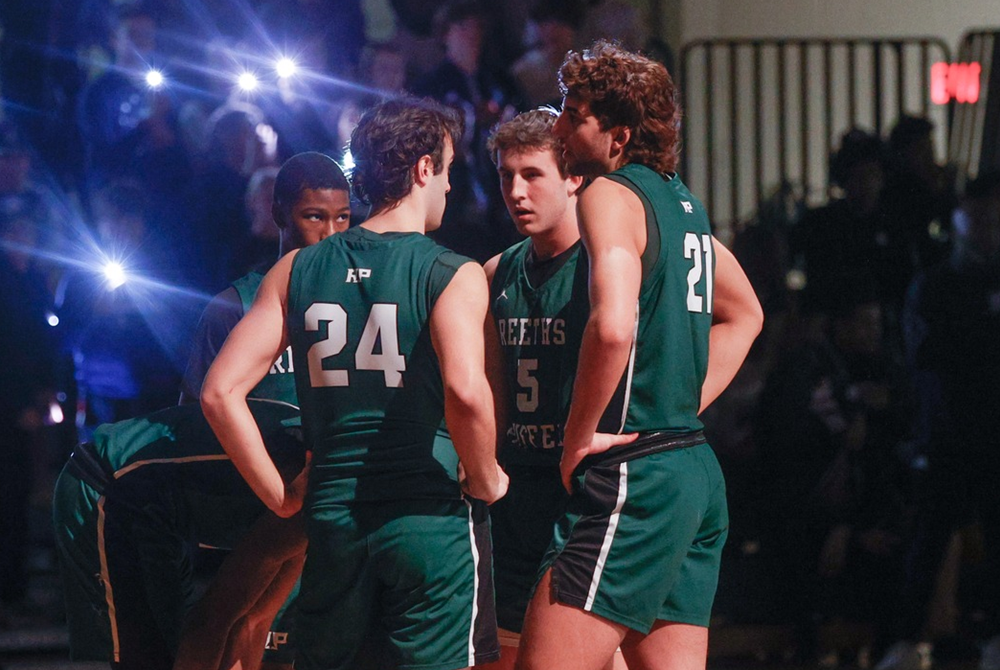
Ambrose & Whitaker Teaming Up Again to Power Reeths-Puffer Hoops Surge
By
Tom Kendra
Special for MHSAA.com
February 7, 2024
Travis Ambrose and Jaxson Whitaker love to compete, and they love their school.
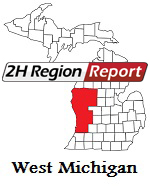 The good friends, who are best known around Muskegon Reeths-Puffer as basketball players, were recruited onto the football team this fall and both made an immediate impact at receiver – with Ambrose getting a Division I scholarship offer from Central Michigan University before playing a varsity game.
The good friends, who are best known around Muskegon Reeths-Puffer as basketball players, were recruited onto the football team this fall and both made an immediate impact at receiver – with Ambrose getting a Division I scholarship offer from Central Michigan University before playing a varsity game.
Last spring, for the heck of it, they played on the tennis team for the first time and crushed it in doubles.
So last week, when the senior duo – arguably one of the best inside-outside tandems in the entire state – led the Rockets to a convincing 63-45 victory at state-ranked Muskegon (the Big Reds’ first home regular-season loss in three years), it was a source of immense pride.
“We wanted to show people that Muskegon isn’t the only basketball power in this area,” explained Ambrose, a 6-foot-8 center who dominated the game on both ends with a triple-double of 24 points, 14 rebounds and 10 blocks.
“People on the East Side think it’s only Muskegon and no one else. We want people to know about Reeths-Puffer.”
Puffer followed up that epic win with another Friday night at rival Muskegon Mona Shores to improve to 15-1 overall and 9-0 in the Ottawa-Kent Conference Green, and jumped into the state’s Associated Press Division 1 rankings this week at No. 9, one spot behind Muskegon.
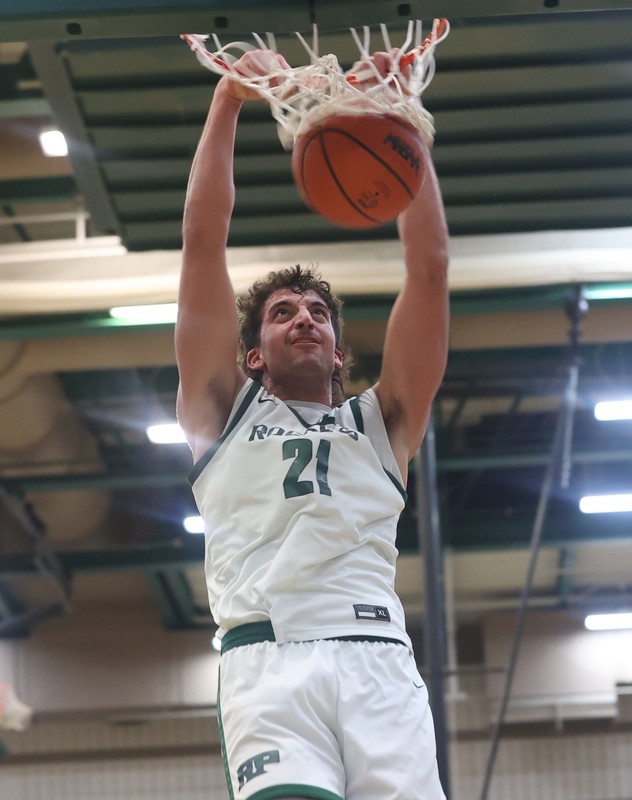 “It was a great week for our school,” said third-year R-P coach Nate Aardema. “It meant a lot to get a win like that at Muskegon and that it wasn’t fluky, like banking in a 3-pointer at the buzzer to win. We earned it.”
“It was a great week for our school,” said third-year R-P coach Nate Aardema. “It meant a lot to get a win like that at Muskegon and that it wasn’t fluky, like banking in a 3-pointer at the buzzer to win. We earned it.”
The Rockets, whose only loss came back on Dec. 15 against Hudsonville, are now in position to end a nearly 40-year drought without a conference championship.
It was actually 1985 when R-P won the Seaway Conference title behind star center Mark Hughes, who went on to captain Michigan to a national championship and is now an executive with the Los Angeles Clippers. That was also the last year the Rockets won a District championship.
Aardema knows his team still faces a difficult road to capture those titles, starting with a home rematch Friday night against Muskegon.
That road got rougher Monday night, when Ambrose injured his hip in practice, forcing him to miss Tuesday’s home game against Holland. His absence left a hole in the lineup, especially on the defensive end, as the Rockets barely held on for their 12th straight win, 67-64, after beating the Dutch by 32 points in their first meeting this season.
Ambrose, who grew up in California and came back to his mother’s hometown of Muskegon his freshman year so he could play sports during the COVID-19 pandemic, is hopeful he will be back for Friday’s rematch with Muskegon.
Ambrose (6-8, 240 pounds) is an extremely mobile big man who is averaging 19.5 points per game (and shoots 65 percent from the floor), along with 10.1 rebounds and 3.4 blocks.
His athletic ability was so apparent that CMU football made him an offer at its summer camp, before he had even played a varsity snap. Ambrose validated Central’s confidence with a breakout season last fall – finishing with 25 catches for 304 yards and seven TDs while being recognized as the team’s best blocker at tight end.
“When he got that offer to Central for football, he was in the gym that same day working on basketball,” said Aardema. “I asked him if he was still all-in for basketball, and he told me: ‘Of course. I don’t want to let my team down.’”
Whitaker, a 6-4 shooting guard, was the other key receiver last fall for the Rockets, who finished 7-3 and nearly knocked off Muskegon and Mona Shores on the gridiron as well.
“I’m super-glad that I decided to play football my senior year,” said Whitaker, who, like Ambrose, was recruited by coach Cody Kater after not playing football his junior year. “I learned so much from our coaches and the other guys on the team. It was a great experience overall.”
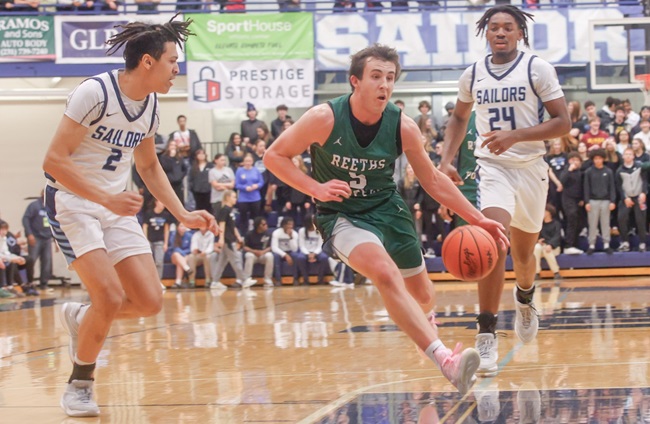 Whitaker, who was committed to Ferris State for basketball, is a lethal 3-point shooter who can also use his size and strength to drive to the basket. He is the school’s all-time leader in 3-point shooting and averages 17 points, five assists and four rebounds per game.
Whitaker, who was committed to Ferris State for basketball, is a lethal 3-point shooter who can also use his size and strength to drive to the basket. He is the school’s all-time leader in 3-point shooting and averages 17 points, five assists and four rebounds per game.
Whitaker stepped up with Ambrose out of the lineup Tuesday, going off for 31 points (including six 3-pointers) to go along with six rebounds.
The other senior starter for R-P is 6-4 Antrel Jones, a great passer on the hardwood who, appropriately, was the Rockets’ quarterback on the football field. Jones averages six points, six rebounds and three assists per game.
Rounding out the starting lineup are 6-4 junior Brayden Mitchelson (7.0 points, 5.0 rebounds, 3.0 assists) and 6-1 sophomore Marvin Moore (9.0 ppg), who made four clutch free throws Tuesday night to preserve the victory over Holland.
In addition to the second showdown with Muskegon on Friday, the Rockets have another huge game on Feb. 17 against No. 5-ranked North Farmington at the Wilson Chandler Invitational at Grand Rapids Catholic Central. R-P then ends the regular season with tough league matchups against Zeeland East and Zeeland West.
Whitaker said the key to the remainder of the season, in addition to getting Ambrose back on the court and healthy, will be overcoming the Rockets’ lack of basketball tradition and truly believing they belong in big games in March.
“We should have the mindset that we are one of the best teams in the state,” said Whitaker. “If we believe that and play with that focus and confidence, we should keep winning games.”
 Tom Kendra worked 23 years at The Muskegon Chronicle, including five as assistant sports editor and the final six as sports editor through 2011. E-mail him at [email protected] with story ideas for Muskegon, Oceana, Mason, Lake, Oceola, Mecosta and Newaygo counties.
Tom Kendra worked 23 years at The Muskegon Chronicle, including five as assistant sports editor and the final six as sports editor through 2011. E-mail him at [email protected] with story ideas for Muskegon, Oceana, Mason, Lake, Oceola, Mecosta and Newaygo counties.
PHOTOS (Top) Muskegon Reeths-Puffer’s starters including Travis Ambrose (21) and Jaxson Whitaker (5) huddle before the start of Friday’s win over Mona Shores. (Middle) Ambrose dunks against Zeeland East. (Below) Whitaker gets to the lane as Sailors defenders converge. (Photos by Joe Lane/Joe's Creative Expressions.)

